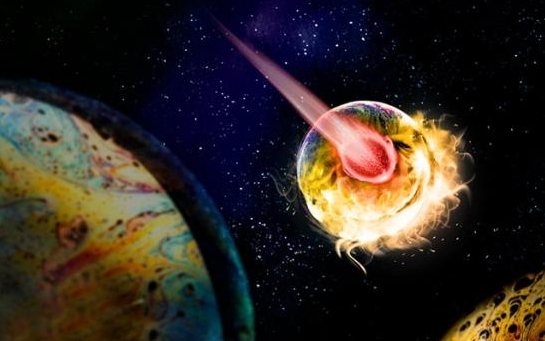Martin Rees, Britain's astronomer royal, believes that there are many universes, possibly an infinite number, each with different attributes, in different combinations, and that we simply live in one that combines things in the way that allows us to exist. He makes an analogy with a very large clothing store: "If there is a large stock of clothing, you're not surprised to find a suit that fits. If there are many universes, each governed by a differing set of numbers, there will be one where there is a particular set of numbers suitable to life. We are in that one.
英國皇家天文學(xué)家馬丁·里斯認(rèn)為,有許多個宇宙,很可能是無數(shù)個,每個都有不同的特性,不同的組合,我們只是生活在一個其組合的方式恰好適于我們存在的宇宙里。他以一家大服裝店作為例子來進(jìn)行類比:"要是服裝品種很多,你就不難挑到一件合身的衣服。要是有許多宇宙,而每個宇宙都由一套不同的數(shù)據(jù)控制,那么就會有一個宇宙,它的一套特定的數(shù)據(jù)適合于生命。我們恰好在這樣的一個宇宙里。"

Rees maintains that six numbers in particular govern our universe, and that if any of these values were changed even very slightly things could not be as they are. For example, for the universe to exist as it does requires that hydrogen be converted to helium in a precise but comparatively stately manner—specifically, in a way that converts seven one-thousandths of its mass to energy.
里斯認(rèn)為,我們的宇宙受到6個數(shù)據(jù)的支配,要是哪個值發(fā)生哪怕是非常細(xì)微的變化,事物就不可能是現(xiàn)在的這個模樣。比如,現(xiàn)在的宇宙若要存在,就要求氫以準(zhǔn)確而較為穩(wěn)定的方式--說得具體一點,要以將千分之七的質(zhì)量轉(zhuǎn)化為能量的方式--轉(zhuǎn)化為氦。
Lower that value very slightly—from 0.007 percent to 0.006 percent, say—and no transformation could take place: the universe would consist of hydrogen and nothing else. Raise the value very slightly—to 0.008 percent—and bonding would be so wildly prolific that the hydrogen would long since have been exhausted. In either case, with the slightest tweaking of the numbers the universe as we know and need it would not be here.
要是那個值稍稍低一點--比如從千分之七降至千分之六--那么就不可能發(fā)生轉(zhuǎn)化:宇宙只會由氫組成。要是那個值稍稍高一點--高到千分之八--結(jié)合就會不間斷地發(fā)生,氫早已消耗殆盡。無論是哪種情況,只要這個數(shù)據(jù)稍有變動,我們所知的而又需要的宇宙就不會存在。












